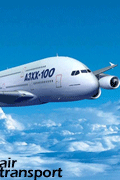Thursday, June 26, 2008
San Francisco Bay Area commuter will have access to cutting-edge real-time traffics, transit and road safety information as results of a $12.4 millions partnership announced today by the U.S. Department of Transportations (DOT) and California Department of Transportations (Caltrans).
"America has the ability-right now-to radically change our driving experiences using innovations that exist today," said Administrator Paul Brubaker of the U.S. DOT Research and Innovative Technology Administration (RITA). "As one of the communities selected last August to participate in the Department's Urban Partnerships program, San Francisco already has shown its commitment to using innovative approaches to reduce traffic congestions. Now, the Bay Area will become the sites of one of the world's largest field tests of Intelligent Transportation Systems technology (ITS).
The award to Caltrans is part of the Department's new SafeTrip-21 initiative, which will test various ITS technology applications. It designed to reduce gridlock and traffic related fatalities and injuries on America's roadways, and improve public transportation services.
Randy Iwasaki, Chief Deputy Director of Caltrans added, "SafeTrip-21 is one of many ways that the public and private sectors can collaborate to create cost-effective transportation solutions focused on improving the traveler's commuting convenience and overall safety."
The SafeTrip-21 partnership will field-test GPS equipped cellular phones from up to 10,000 volunteers' commuters and transit vehicles transmitting data from roads in a 200 miles radius to traffic management centers. The additional traffic information's gathered by these "probes" will help all Bay Area commuters make intelligent travels choices and avoid congestion while driving to work or using local transit systems.
SafeTrip-21 is working to develop a consumer friendly platforms that brings together existing technologies including trip planning and traveler's information; safety advisories; on-board displays of commuter rail and bus transit connections; electronic toll collection, and parking reservations and payment services.
The partnerships also will establish a national "test bed" to advance the development of a Vehicle Infrastructure Integration systems, which uses Wi-Fi and Dedicated Short Range Communication to alert drivers to unsafe conditions so they can avoid crashes before they happen.
Multiple consumer electronic devices will be used including personal navigation devices, mobile phones, and a diverse set of communication technologies. In addition, an in-vehicle transport "cradle" will provide a wireless interface to the Internet for virtually any mobile electronic device.
Other SafeTrip-21 partners include the University of California-Partners for Advanced Transit and Highways (PATH), California Center for Innovative Transportation (CCIT), Nokia, NAVTEQ, Metropolitan Transportation Commission, Santa Clara Valley Transportation Authority, and Nissan.
"America has the ability-right now-to radically change our driving experiences using innovations that exist today," said Administrator Paul Brubaker of the U.S. DOT Research and Innovative Technology Administration (RITA). "As one of the communities selected last August to participate in the Department's Urban Partnerships program, San Francisco already has shown its commitment to using innovative approaches to reduce traffic congestions. Now, the Bay Area will become the sites of one of the world's largest field tests of Intelligent Transportation Systems technology (ITS).
The award to Caltrans is part of the Department's new SafeTrip-21 initiative, which will test various ITS technology applications. It designed to reduce gridlock and traffic related fatalities and injuries on America's roadways, and improve public transportation services.
Randy Iwasaki, Chief Deputy Director of Caltrans added, "SafeTrip-21 is one of many ways that the public and private sectors can collaborate to create cost-effective transportation solutions focused on improving the traveler's commuting convenience and overall safety."
The SafeTrip-21 partnership will field-test GPS equipped cellular phones from up to 10,000 volunteers' commuters and transit vehicles transmitting data from roads in a 200 miles radius to traffic management centers. The additional traffic information's gathered by these "probes" will help all Bay Area commuters make intelligent travels choices and avoid congestion while driving to work or using local transit systems.
SafeTrip-21 is working to develop a consumer friendly platforms that brings together existing technologies including trip planning and traveler's information; safety advisories; on-board displays of commuter rail and bus transit connections; electronic toll collection, and parking reservations and payment services.
The partnerships also will establish a national "test bed" to advance the development of a Vehicle Infrastructure Integration systems, which uses Wi-Fi and Dedicated Short Range Communication to alert drivers to unsafe conditions so they can avoid crashes before they happen.
Multiple consumer electronic devices will be used including personal navigation devices, mobile phones, and a diverse set of communication technologies. In addition, an in-vehicle transport "cradle" will provide a wireless interface to the Internet for virtually any mobile electronic device.
Other SafeTrip-21 partners include the University of California-Partners for Advanced Transit and Highways (PATH), California Center for Innovative Transportation (CCIT), Nokia, NAVTEQ, Metropolitan Transportation Commission, Santa Clara Valley Transportation Authority, and Nissan.
posted by transport blogs
@ 10:04 PM
permanent link | Post a Comment
|
![]()








